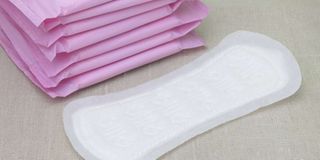Why do sanitary towels cause itch and warts?

Some sanitary towels have been associated with warts and itchy skin. PHOTO | FOTOSEARCH
Dr Flo,
My girlfriend used some sanitary pads some time back and they irritated her skin. She started itching and she would scratch her private parts all the time. She developed warts around the area, making her feel very bad. She has lost interest in sex and she feels the best way to get rid of the warts is to cut them. What medicine can she use?
L I
Dear L I,
Warts are growths or lesions caused by the human papillomavirus (HPV). The warts can grow on the skin in any part of the body and also on mucus membranes. They are transmitted through skin-to-skin contact. Many times, the body clears the HPV infection before warts can develop. Once warts develop, most heal by themselves over time. There are medications that can be applied directly on the warts such as podophyllin, imiquimod, trichloroacetic acid and salicylic acid. In case the warts do not disappear with treatment, they may be removed by cryotherapy, electrocautery, laser removal or through surgery. She should not attempt to cut them off herself because the bleeding may be severe, and the area may get infected.
A few types of the HPVs have a strong link with cervical cancer. HPV has also been associated with cancers of the vagina, vulva, anus, penis, mouth and throat (oropharyngeal cancer). Very few people who have HPV or warts will get cancer, and HPV is usually not the only risk factor. There are vaccines that are used to protect against the strains of HPV that are more likely to cause genital warts or cervical cancer.
Dr Flo,
I constantly experience a strong urge to urinate, pain in the lower abdomen, pain during urination and frequent urination. This started about a month ago. What might be the problem and the cure?
Francis
Dear Francis,
The pain during urination, the frequent strong urge to urinate and the lower abdominal pain suggest that you have an infection in the urinary tract. This infection may be anywhere along the tract, in the kidneys, ureters, bladder or urethra and it may also spread to the prostate, the epididymis and the testicles. Urinary tract infections (UTIs) are commonly caused by bacteria that live in the intestines and they can travel from the anus to the urethral opening (where urine comes out), since the two are not far from each other. Women are more likely to get UTIs because they have a shorter urethra (the tube that carries urine to the outside) compared to men, which makes it easier for bacteria to travel up to the bladder and cause infection there. A man has a greater risk of getting UTI if he does not drink enough water, is immobile for long, if the prostate is enlarged (more common in men over 50) or if one engages in anal intercourse. It may also be acquired through sexual contact with an infected partner.
You need to have the urine and any discharge present examined. It would also be advisable to do an STI screen, including HIV test. UTIs are easily treated with antibiotics, depending on the results of the test. If the symptoms do not go away, you may need a longer course of antibiotics or a different type of antibiotics to clear the infection, even though the urine test may be normal. Also, take a lot of fluids, about 1.5 to two litres per day; urinate when you need to without delay, and wipe yourself from front to back. Abstain from sexual intercourse until you have completed treatment, and you have been retested and found to be cured. Any sexual partners you have had in the past three to six months also need to be treated, for their own health’s sake, and also to prevent re-infection to you.
Dr Flo,
I am 29 years old. Sometimes I experience lower abdominal pain just above the waistline, mostly on the left side and occasionally on the right. This usually happens after eating a lot of meat or refined starches like white bread. I take enough water and I am rarely dehydrated. I have never been examined by a doctor. What could be the problem?
Bryan
Dear Bryan,
Pain on the left side of the abdomen can be caused by any of the organs on that side of the body. This includes the digestive tract, the urinary tract and the reproductive tract. Issues in the digestive tract include hyperacidity and gastritis, peptic ulcer disease, digestive problems, infections or inflammatory conditions. In the urinary tract, you may have infections, kidney stones, or inflammatory conditions anywhere along the tract from the kidney to the urethra.
Since your symptoms seem to be triggered by specific foods, then it is likely that the pain is caused by a digestive tract problem, either due to poor digestion or inflammation caused by those specific foods. It would be advisable for you to be examined by a stomach specialist (gastroenterologist) to figure out the exact cause of the problem. In the meantime, take non-refined starches, limit the amount of meat you take per day to 0.8g per kilogramme body weight. This means that if you weigh 70kg, you need only 56g of protein per day or what can fit in the palm of your hand. Protein is not stored in the body, so all the extra protein you take has to be processed by the body then discarded. Also, take a lot of fruit and vegetables to increase the amount of fibre in your diet, continue to take water (at least 1.5 litres per day) and exercise. There are also medications that can be prescribed that have enzymes which can help with digestion.
For free expert advice send your medical questions to [email protected]


